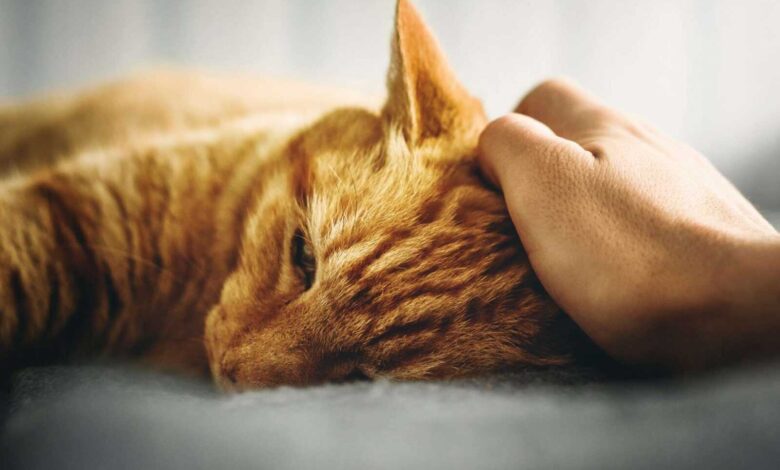
Cats are known for their fastidious grooming habits and delicate digestive systems. However, despite their careful attention to cleanliness, vomiting is a common occurrence in feline companions. While the occasional bout of vomiting may not be cause for alarm, recurrent or persistent vomiting can indicate an underlying health issue that requires veterinary attention. In this comprehensive guide, we delve into the causes, symptoms, and treatment options for cat vomiting, empowering you to better understand and address this common feline concern.
Causes of Cat Vomiting
Cat vomiting can be triggered by various factors, ranging from minor irritants to serious medical conditions. Common causes of cat vomiting include:
- Dietary Indiscretion: Cats may vomit after consuming spoiled food, eating too quickly, or ingesting foreign objects.
- Hairballs: As meticulous groomers, cats frequently ingest loose fur while grooming, which can accumulate in their stomachs and trigger vomiting.
- Gastrointestinal Disorders: Conditions such as gastritis, inflammatory bowel disease (IBD), pancreatitis, and gastrointestinal obstructions can cause vomiting in cats.
- Toxic Ingestion: Ingestion of toxic substances such as plants, household chemicals, medications, or certain foods can lead to vomiting in cats.
- Parasites: Internal parasites such as roundworms, hookworms, and tapeworms can irritate the gastrointestinal tract and induce vomiting.
- Infections: Viral, bacterial, or fungal infections affecting the digestive system can cause vomiting in cats.
Symptoms of Cat Vomiting
Recognizing the signs of vomiting in cats is essential for early intervention and appropriate treatment. Common symptoms of cat vomiting include:
- Repeated Episodes: Cats may vomit multiple times within a short period or experience recurrent vomiting over time.
- Regurgitation: Some cats may regurgitate food or fluid without prior warning, often in a tube-like shape.
- Change in Appetite: Vomiting can lead to a decreased appetite or reluctance to eat, especially if the underlying cause is related to gastrointestinal discomfort.
- Lethargy: Cats may appear lethargic, weak, or listless following vomiting episodes.
- Dehydration: Prolonged vomiting can lead to dehydration, characterized by dry, tacky gums, sunken eyes, and reduced skin elasticity.
- Additional Symptoms: Depending on the underlying cause, cats may exhibit other symptoms such as diarrhea, abdominal pain, weight loss, or fever.
Treatment Options for Cat Vomiting
Treatment for cat vomiting depends on the underlying cause and severity of the condition. In many cases, mild or occasional vomiting may resolve on its own with supportive care. However, persistent or severe vomiting requires veterinary evaluation and intervention. Treatment options for cat vomiting may include:
- Dietary Management: Switching to a bland or easily digestible diet, feeding smaller, more frequent meals, or eliminating potential dietary triggers can help manage vomiting associated with dietary indiscretion or gastrointestinal disorders.
- Hydration Support: Providing access to fresh water and encouraging hydration is crucial, especially if vomiting has led to dehydration. In severe cases, intravenous fluids administered by a veterinarian may be necessary to restore hydration.
- Medication: Veterinarians may prescribe medications such as antiemetics (to reduce vomiting), antacids (to reduce stomach acidity), or antibiotics (to treat infections) based on the underlying cause of vomiting.
- Parasite Control: Treatment for internal parasites may be necessary if parasitic infestation is identified as the cause of vomiting.
- Diagnostic Testing: Diagnostic tests such as bloodwork, fecal analysis, X-rays, ultrasound, or endoscopy may be recommended to identify the underlying cause of vomiting and guide treatment decisions.
Preventive Measures for Cat Vomiting
While some causes of cat vomiting are unavoidable, there are steps you can take to minimize the risk and frequency of vomiting episodes:
- Monitor Diet: Feed your cat a high-quality, well-balanced diet appropriate for their age, health status, and dietary preferences. Avoid sudden changes in diet, and refrain from offering table scraps or potentially harmful foods.
- Hairball Prevention: Regular grooming and the use of hairball remedies or specialized diets can help reduce hairball formation and minimize associated vomiting.
- Environmental Safety: Keep hazardous substances, plants, medications, and small objects out of reach to prevent accidental ingestion and poisoning.
- Parasite Prevention: Follow your veterinarian’s recommendations for year-round parasite prevention, including regular deworming and flea control.
- Routine Veterinary Care: Schedule regular wellness exams for your cat and promptly address any signs of illness or abnormal behavior to prevent potential health issues from escalating.
When to Consult a Veterinarian
While occasional vomiting may be considered normal for cats, persistent or recurrent vomiting warrants veterinary evaluation. Contact your veterinarian if:
- Your cat vomits frequently or repeatedly within a short period.
- Vomiting is accompanied by other concerning symptoms such as lethargy, diarrhea, or dehydration.
- Your cat’s appetite, behavior, or overall condition changes.
- Your cat has a history of underlying medical conditions or is at risk for complications due to age or other factors.
Ten Effective Medications for Treating Vomiting in Cats in the USA
Here are ten effective medications commonly used for treating vomiting in cats in the USA:
- Cerenia (Maropitant Citrate): Cerenia is a prescription medication available in injectable and oral forms. It is commonly prescribed to control vomiting caused by motion sickness, chemotherapy, or underlying gastrointestinal issues.
- Famotidine (Pepcid AC): Famotidine is an over-the-counter medication that belongs to a class of drugs known as H2 blockers. It helps reduce stomach acid production and can be used to alleviate vomiting associated with gastritis or acid reflux in cats.
- Metoclopramide (Reglan): Metoclopramide is a prescription medication that acts on the gastrointestinal tract to enhance motility and reduce nausea and vomiting. It is commonly used to manage vomiting caused by various gastrointestinal disorders in cats.
- Ondansetron (Zofran): Ondansetron is a prescription medication available in oral, injectable, and intravenous forms. It works by blocking serotonin receptors in the brain and gastrointestinal tract, reducing the sensation of nausea and vomiting in cats.
- Sucralfate (Carafate): Sucralfate is a prescription medication that forms a protective coating over the stomach lining, helping to alleviate inflammation and irritation. It is commonly used to treat vomiting associated with gastritis or gastric ulcers in cats.
- Metronidazole (Flagyl): Metronidazole is a prescription antibiotic medication that can help treat vomiting caused by gastrointestinal infections or inflammatory bowel disease (IBD) in cats.
- Cimetidine (Tagamet): Cimetidine is an over-the-counter medication belonging to the class of H2 blockers. It helps reduce stomach acid production and can be used to alleviate vomiting associated with gastritis or acid reflux in cats.
- Omeprazole (Prilosec): Omeprazole is an over-the-counter medication that belongs to a class of drugs known as proton pump inhibitors (PPIs). It helps reduce stomach acid production and can be used to manage vomiting associated with gastritis or acid reflux in cats.
- Doxycycline: Doxycycline is a prescription antibiotic medication commonly used to treat bacterial infections in cats. In cases where vomiting is caused by an underlying bacterial infection, doxycycline may be prescribed to address the underlying cause.
- Prednisolone: Prednisolone is a prescription corticosteroid medication that helps reduce inflammation and suppress the immune system. It is commonly used to manage vomiting associated with inflammatory conditions such as inflammatory bowel disease (IBD) in cats.
Always consult with a veterinarian before administering any medication to your cat, as they can provide guidance on the most appropriate treatment based on your cat’s specific needs and medical history.
Navigating Cat Vomiting with Care
Cat vomiting can be a distressing experience for both cats and their owners, but with proper understanding and proactive management, it can be effectively addressed. By recognizing the potential causes, symptoms, and treatment options for cat vomiting, you can provide your feline companion with the care and support they need to maintain optimal health and well-being.
FAQs: Cat Vomiting:
Q: Is it normal for cats to vomit occasionally?
A: Occasional vomiting can be normal for cats, especially if they have ingested hairballs or eaten too quickly. However, frequent or persistent vomiting may indicate an underlying health issue and should be evaluated by a veterinarian.
Q: What are common causes of vomiting in cats?
A: Common causes of vomiting in cats include dietary indiscretion, hairballs, gastrointestinal disorders (such as gastritis or inflammatory bowel disease), infections, parasites, and ingestion of toxic substances.
Q: When should I be concerned about my cat’s vomiting?
A: You should be concerned if your cat vomits frequently (multiple times within a short period), vomits repeatedly over time, shows signs of dehydration, experiences lethargy or weakness, or exhibits other concerning symptoms such as diarrhea or abdominal pain.
Q: How can I help prevent vomiting in my cat?
A: To help prevent vomiting in your cat, ensure they have access to a balanced diet appropriate for their age and health status, feed smaller, more frequent meals, groom them regularly to reduce hairballs, keep hazardous substances out of reach, and provide routine veterinary care.
Q: When should I consult a veterinarian about my cat’s vomiting?
A: You should consult a veterinarian if your cat vomits frequently, vomits persistently over time, exhibits other concerning symptoms, has a history of underlying medical conditions, or if you have any doubts or concerns about their health. A veterinarian can perform a thorough evaluation and recommend appropriate treatment.
If you have any concerns about your cat’s vomiting or if you require further guidance on managing your cat’s health, consult with your veterinarian for personalized recommendations and assistance. With attentive care and veterinary support, you can help your cat overcome vomiting and enjoy a happy, healthy life.








